General Sir John Monash, Personal Files Book 17, 1 November 1917 - 13 January 1918, Part 8
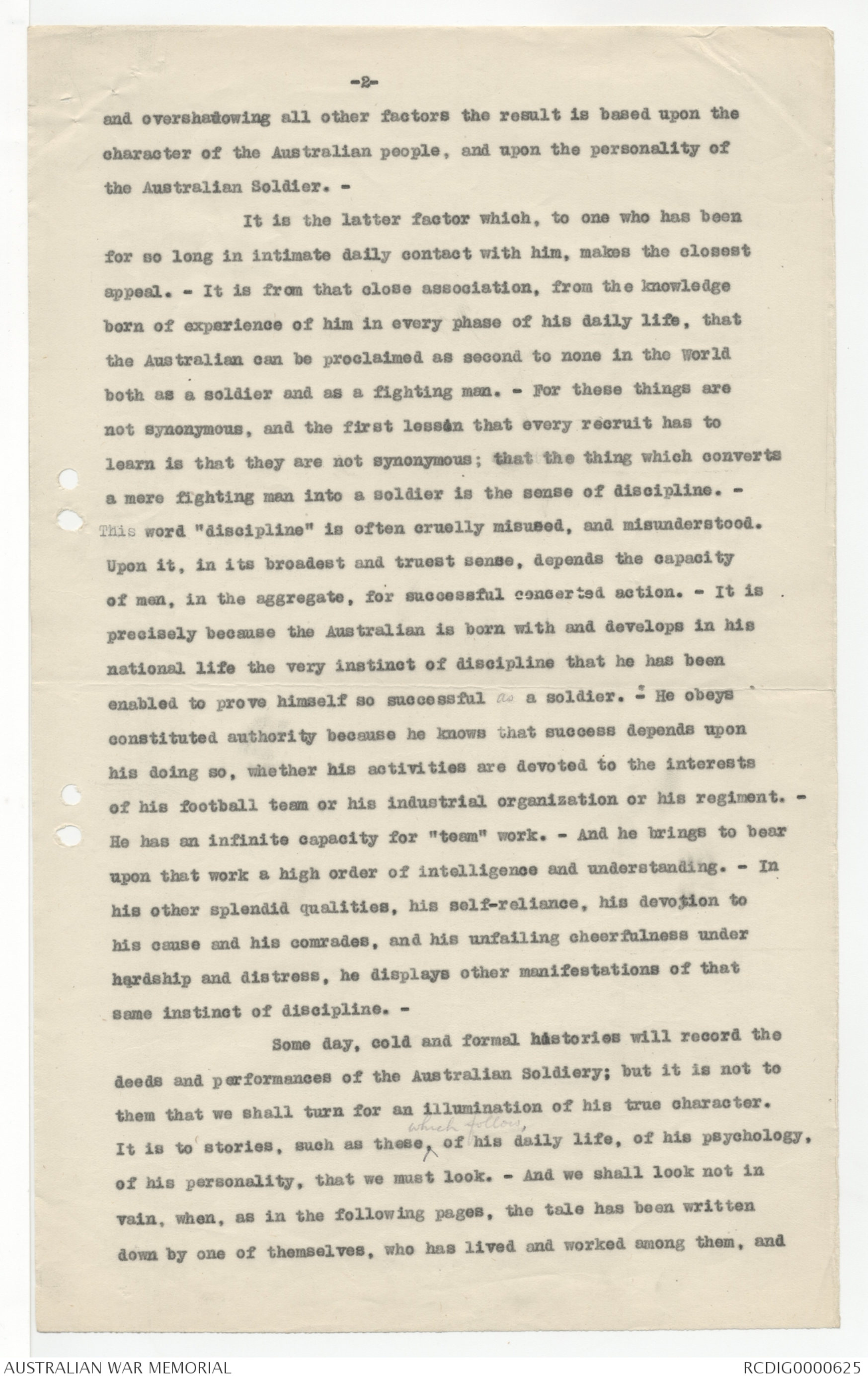
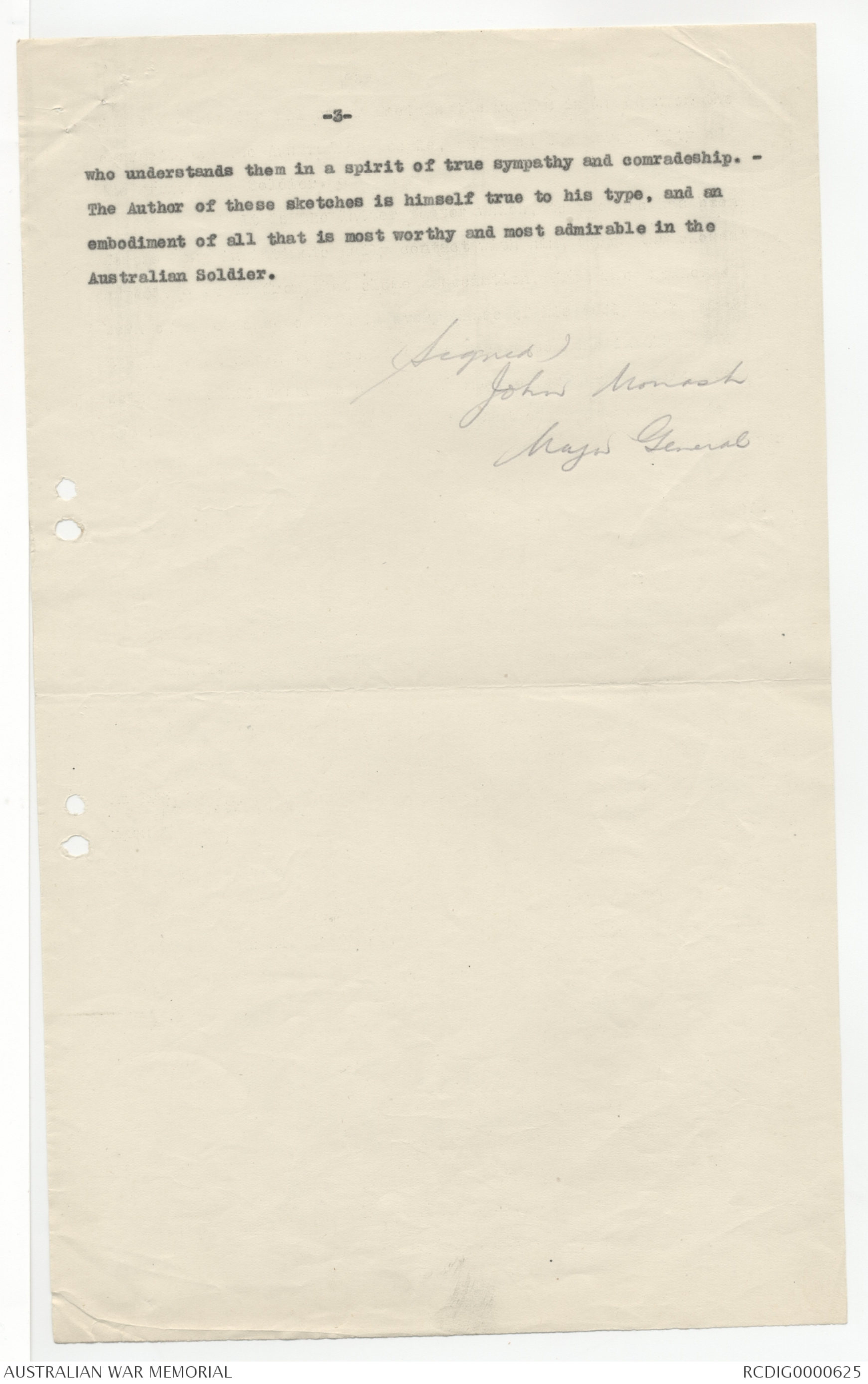
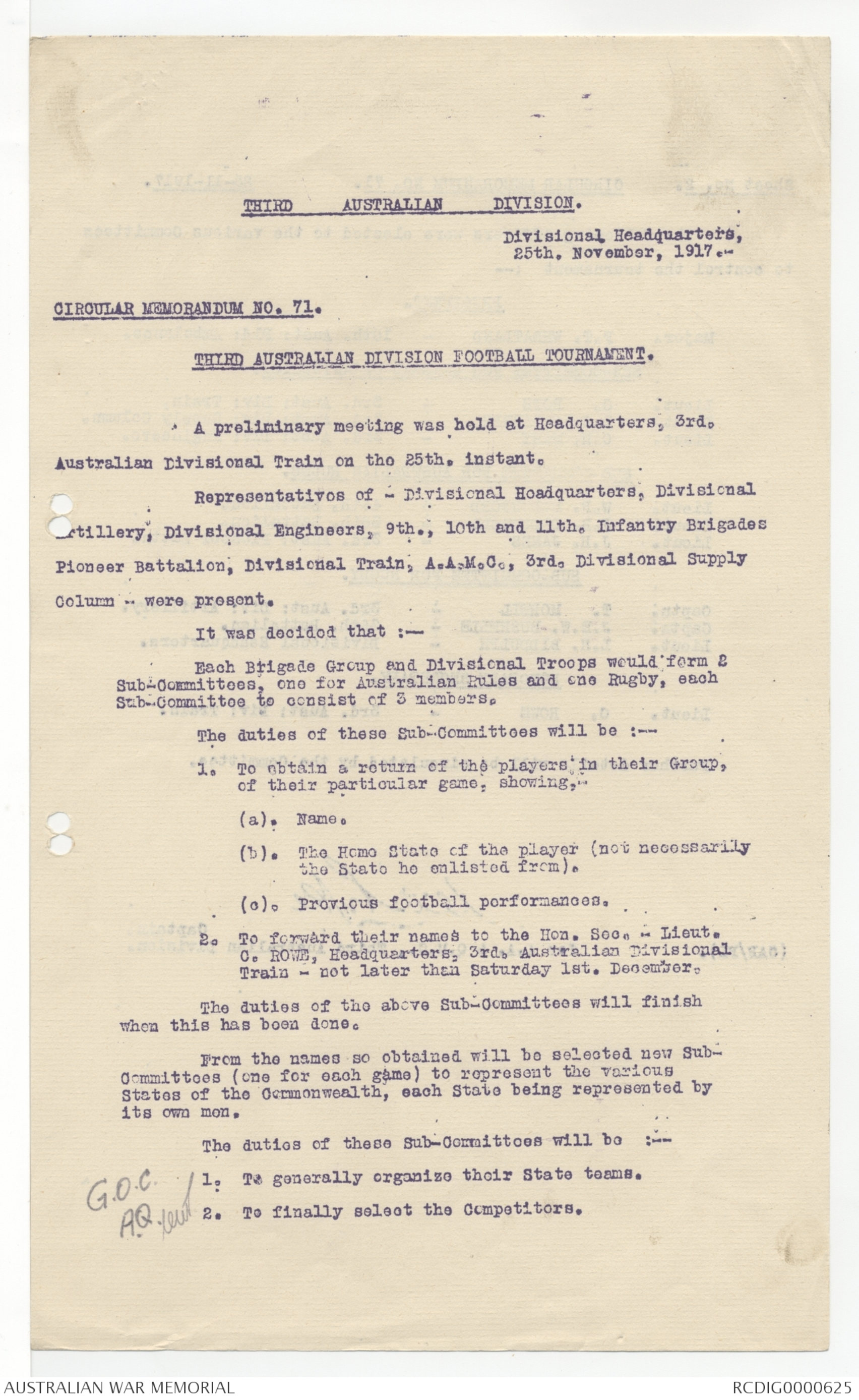
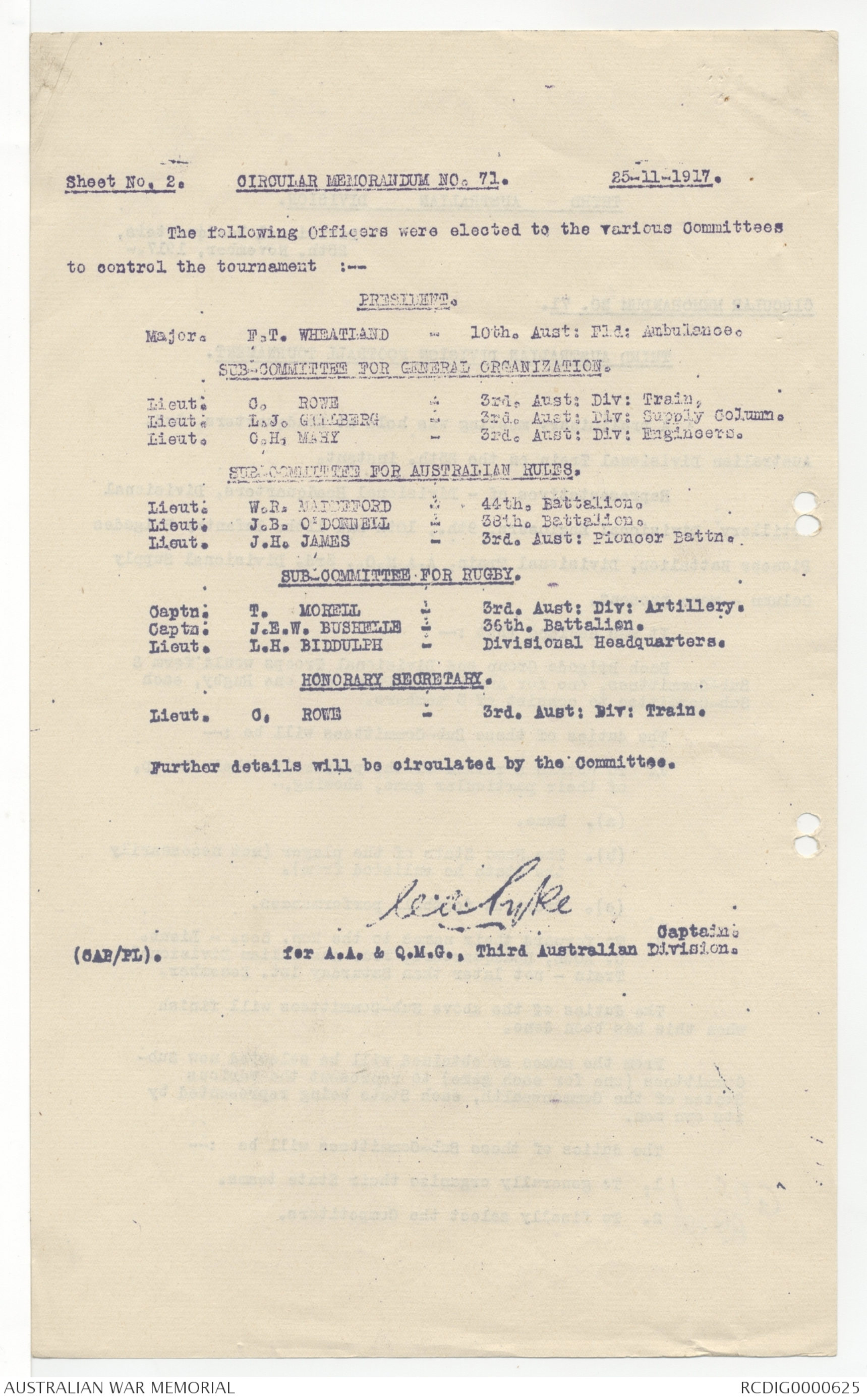
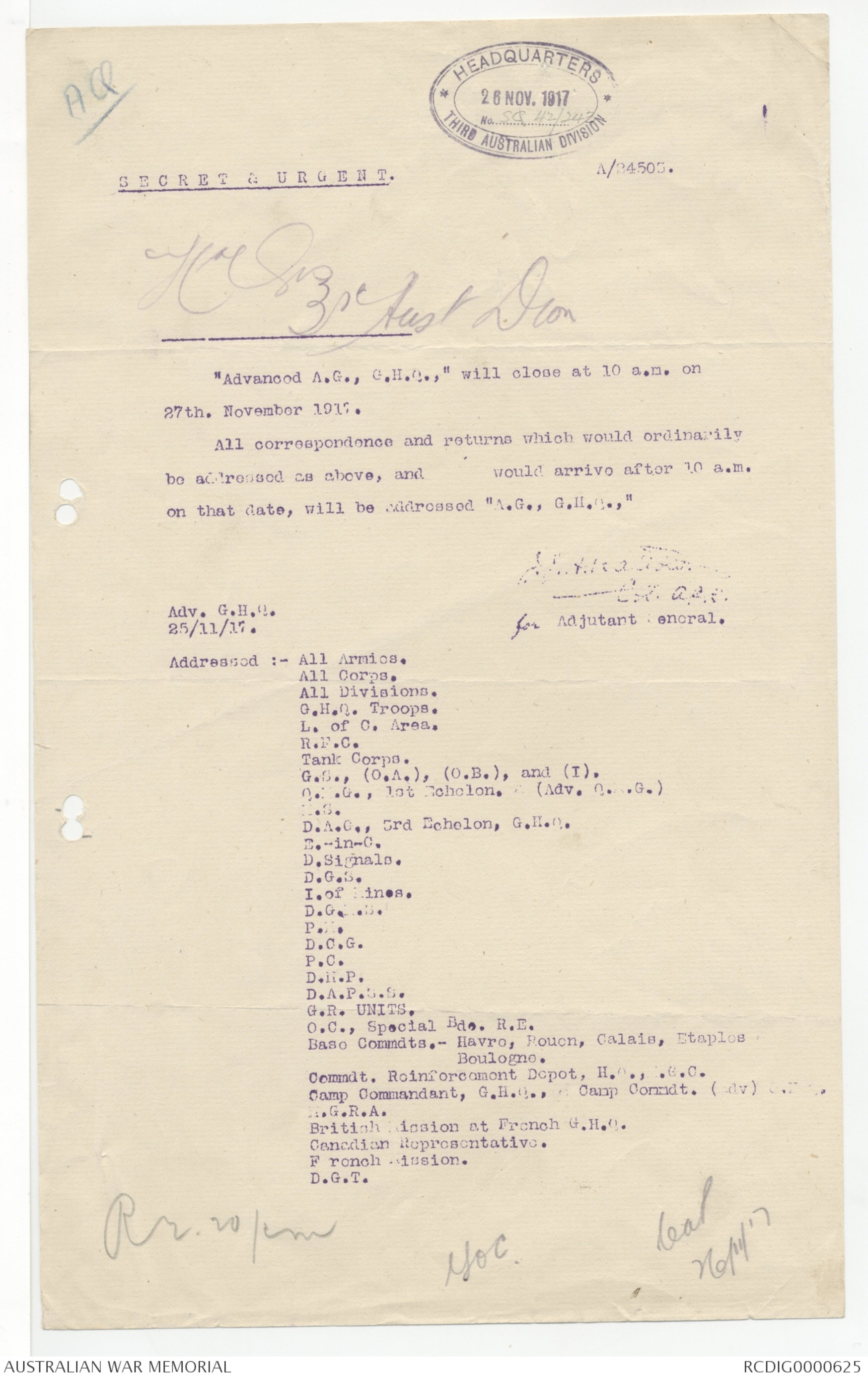
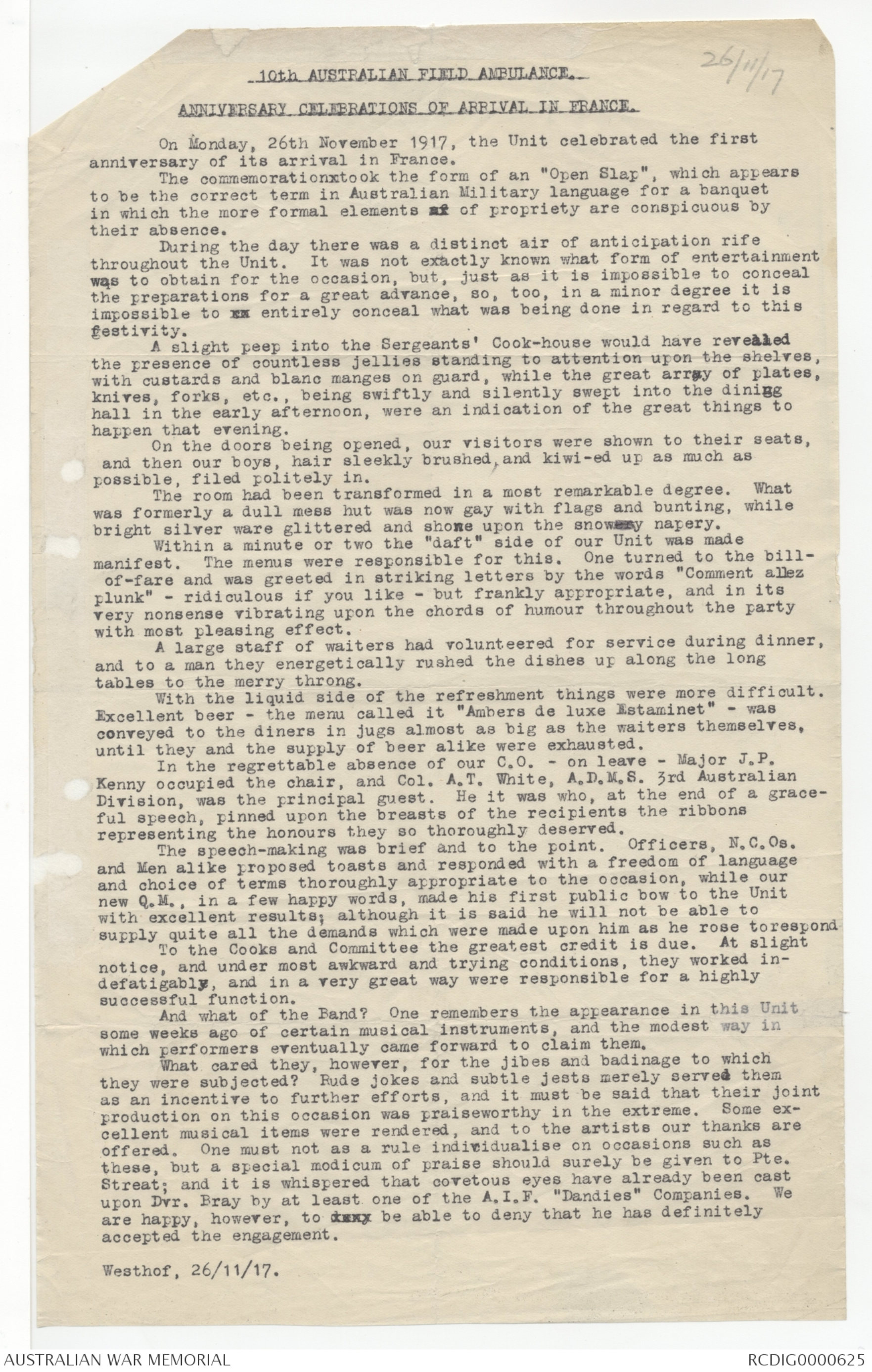
-2-
and overshadowing all other factors the result is based upon the
character of the Australian people, and upon the personality of
the Australian Soldier. -
It is the latter factor which, to one who has been
for so long in intimate daily contact with him, makes the closest
appeal. - It is from that close association, from the knowledge
born of experience of him in every phase of his daily life, that
the Australian can be proclaimed as second to none in the world
both as a soldier and as a fighting man. - For these things are
not synonymous, and the first lesson that every recruit has to
learn is that they are not synonymous; that the thing which converts a mere fighting man into a soldier is the sense of discipline. -
This word "discipline" is often cruelly misused, and misunderstood.
Upon it, in its broadest and truest sense, depends the capacity
of men, in the aggregate, for successful concerted action. - It is
precisely because the Australian is born with and develops in his
national life the very instinct of discipline that he has been
enabled to prove himself so successful as a soldier. - He obeys
constituted authority because he knows that success depends upon
his doing so, whether his activities are devoted to the interests
of his football team or his industrial organization or his regiment.
He has an infinite capacity for "team" work. - And he brings to bear
upon that work a high order of intelligence and understanding. - In
his other splendid qualities, his self-reliance, his devotion to
his cause and his comrades, and his unfailing cheerfulness under
hardship and distress, he displays other manifestations of that
same instinct of discipline. -
Some day, cold and formal histories will record the deeds and performances of the Australian Soldiery; but it is not to
them that we shall turn for an illumination of his true character.
It is to stories, such as these, ^which follow, of his daily life, of his psychology, of his personality, that we must look. - And we shall look not in vain, when, as in the following pages, the tale has been written
down by one of themselves, who has lived and worked among them, and
-3-
who understands them in a spirit of true sympathy and comradeship. -
The Author of these sketches is himself true to his type, and an
embodiment of all that is most worthy and most admirable in the
Australian Soldier.
(Signed)
John Monash
Major General
THIRD AUSTRALIAN DIVISION.
Divisional Headquarters,
25th. November, 1917. -
CIRCULAR MEMORANDUM NO. 71.
THIRD AUSTRALIAN DIVISION FOOTBALL TOURNAMENT.
A preliminary meeting was held at Headquarters, 3rd.
Australian Divisional Train on the 25th. instant.
Representatives of - Divisional Headquarters, Divisional
Artillery, Divisional Engineers, 9th., 10th and 11th. Infantry Brigades
Pioneer Battalion, Divisional Train, A.A.M.C., 3rd. Divisional Supply
Column - were present.
It was decided that:-
Each Brigade Group and Divisional Troops would form 2
Sub-Committees, one for Australian Rules and one Rugby, each
Sub-Committee to consist of 3 members.
The duties of these Sub-Committees will be :-
1. To obtain a return of the players in their Group,
of their particular game, showing,-
(a). Name.
(b). The Home State of the player (not necessarily
the State he enlisted from).
(c). Previous football performances.
2. To forward their names to the Hon. Sec. - Lieut.
C. ROWE, Headquarters, 3rd. Australian Divisional
Train - not later than Saturday 1st. December.
The duties of the above Sub-Committees will finish
when this has been done.
From the names so obtained will be selected new Sub-Committees
(one for each game) to represent the various
States of the Commonwealth, each State being represented by
its own men.
The duties of these Sub-Committees will be :- -
[*G.O.C 1. To generally organize their State teams.
A.Q. Leut*] 2. To finally select the Competitors.
Sheet No. 2. CIRCULAR MEMORANDUM NO. 71. 25-11-1917.
The following Officers were elected to the various Committees
to control the tournament :--
PRESIDENT.
Major. F.T. WHEATLAND - 10th. Aust: Fld: Ambulance.
SUB-COMMITTEE FOR GENERAL ORGANIZATION.
Lieut: C. ROWE - 3rd. Aust: Div: Train,
Lieut: L.J. GINSBERG - 3rd. Aust: Div: Supply Column.
Lieut: C. H. MAHY - 3rd. Aust: Div: Engineers.
SUB-COMMITTEE FOR AUSTRALIAN RULES.
Lieut: W.R. MAIDEFORD - 44th. Battalion.
Lieut: J.B. O'DONNELL - 38th. Battalion.
Lieut. J.H. JAMES - 3rd. Aust: Pioneer Battn.
SUB-COMMITTEE FOR RUGBY.
Captn: T. MORELL - 3rd. Aust: Div: Artillery.
Captn: J.E.W. BUSHELLE - 36th. Battalion.
Lieut. L.H. BIDDULPH - Divisional Headquarters.
HONORARY SECRETARY.
Lieut. C. ROWE - 3rd. Aust: Div: Train.
Further details will be circulated by the Committee.
WE Pyke
Captain.
(CAP/PL). for A.A. & Q.M.G., Third Australian Division.
[*AQ*]
HEADQUARTERS
26 NOV. 1917
No. SQ 42/243
THIRD AUSTRALIAN DIVISION
A/24505.
SECRET & URGENT.
HdQrs 3rd Aust Divn
"Advanced A.G., G.H.Q.," will close at 10 a.m. on
27th. November 1917.
All correspondence and returns which would ordinarily
be addressed as above, and would arrive after 10 a.m.
on that date, will be addressed "A.G., G.H.Q.,"
[[J. Batteston?]] [[CR?. A.A.G.?]]
for Adjutant General.
Adv. G.H.Q.
25/11/17.
Addressed :- All Armies.
All Corps.
All Divisions.
G.H.Q. Troops.
L. of C. Area.
R.F.C.
Tank Corps.
G.S., (0.A.), (O.B.), and (I).
Q.M.G., 1st Echelon. (Adv. Q.M.G.)
H.S.
D.A.C., 3rd Echelon, G.H.Q.
E.-in-C.
D. Signals.
D.G.S.
I. of Lines.
D.G.M.S.
P.H.
D.C.G.
P.C.
D.N.P.
D.A.P.S.S.
G.R. UNITS.
O.C., Special Bde. R.E.
Base Commdts.- Havre, Rouen, Calais, Etaples
Boulogne.
Commdt. Reinforcement Depot, H.Q., A. G.C.
Camp Commandant, G.H.Q.. - Camp Commdt. (Adv). [[G.H.Q.?]]
M.G.R.A.
British Mission at French G.H.Q.
Canadian Representative.
French Mission.
D.G.T.
[*R 2.20 pm*]
G.O.C.
[[CaP?]]
26/11/17
26/11/17
10th AUSTRALIAN FIELD AMBULANCE.
ANNIVERSARY CELEBRATIONS OF ARRIVAL IN FRANCE.
On Monday, 26th November 1917, the Unit celebrated the first
anniversary of its arrival in France.
The commemorationxtook the form of an "Open Slap”, which appears
to be the correct term in Australian Military language for a banquet
in which the more formal elements xx of propriety are conspicuous by
their absence.
During the day there was a distinct air of anticipation rife
throughout the Unit. It was not exactly known what form of entertainment
was to obtain for the occasion, but, just as it is impossible to conceal
the preparations for a great advance, so, too, in a minor degree it is
impossible to xx entirely conceal what was being done in regard to this
festivity.
A slight peep into the Sergeants' Cook-house would have revealed
the presence of countless jellies standing to attention upon the shelves,
with custards and blanc manges on guard, while the great array of plates,
knives, forks, etc., being swiftly and silently swept into the dining
hall in the early afternoon, were an indication of the great things to
happen that evening.
On the doors being opened, our visitors were shown to their seats,
and then our boys, hair sleekly brushed, and kiwi-ed up as much as
possible, filed politely in.
The room had been transformed in a most remarkable degree. What
was formerly a dull mess hut was now gay with flags and bunting, while
bright silver ware glittered and shone upon the snowery napery.
Within a minute or two the "daft" side of our Unit was made
manifest. The menus were responsible for this. One turned to the bill-
of-fare and was greeted in striking letters by the words "Comment allez
plunk"- ridiculous if you like - but frankly appropriate, and in its
very nonsense vibrating upon the chords of humour throughout the party
with most pleasing effect.
A large staff of waiters had volunteered for service during dinner,
and to a man they energetically rushed the dishes up along the long
tables to the merry throng.
With the liquid side of the refreshment things were more difficult.
Excellent beer - the menu called it "Ambers de luxe Estaminet" - was
conveyed to the diners in jugs almost as big as the waiters themselves,
until they and the supply of beer alike were exhausted.
In the regrettable absence of our C.0. - on leave - Major J.P.
Kenny occupied the chair, and Col. A.T. White, A.D.M.S. 3rd Australian
Division, was the principal guest. He it was who, at the end of a graceful
speech, pinned upon the breasts of the recipients the ribbons
representing the honours they so thoroughly deserved.
The speech-making was brief and to the point. Officers, N.C.Os.
and Men alike proposed toasts and responded with a freedom of language
and choice of terms thoroughly appropriate to the occasion, while our
new Q.M., in a few happy words, made his first public bow to the Unit
with excellent results; although it is said he will not be able to
supply quite all the demands which were made upon him as he rose torespond
To the Cooks and Committee the greatest credit is due. At slight
notice, and under most awkward and trying conditions, they worked indefatigably, and in a very great way were responsible for a highly
successful function.
And what of the Band? One remembers the appearance in this Unit
some weeks ago of certain musical instruments, and the modest way in
which performers eventually came forward to claim them.
What cared they, however, for the jibes and badinage to which
they were subjected? Rude jokes and subtle jests merely served them
as an incentive to further efforts, and it must be said that their joint
production on this occasion was praiseworthy in the extreme. Some excellent musical items were rendered, and to the artists our thanks are
offered. One must not as a rule individualise on occasions such as
these, but a special modicum of praise should surely be given to Pte.
Streat; and it is whispered that covetous eyes have already been cast
upon Dvr. Bray by at least one of the A.I.F. "Dandies" Companies. We
are happy, however, to xxxx be able to deny that he has definitely
accepted the engagement.
Westhof, 26/11/17.
 Sam scott
Sam scottThis transcription item is now locked to you for editing. To release the lock either Save your changes or Cancel.
This lock will be automatically released after 60 minutes of inactivity.